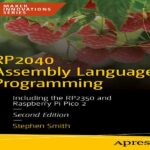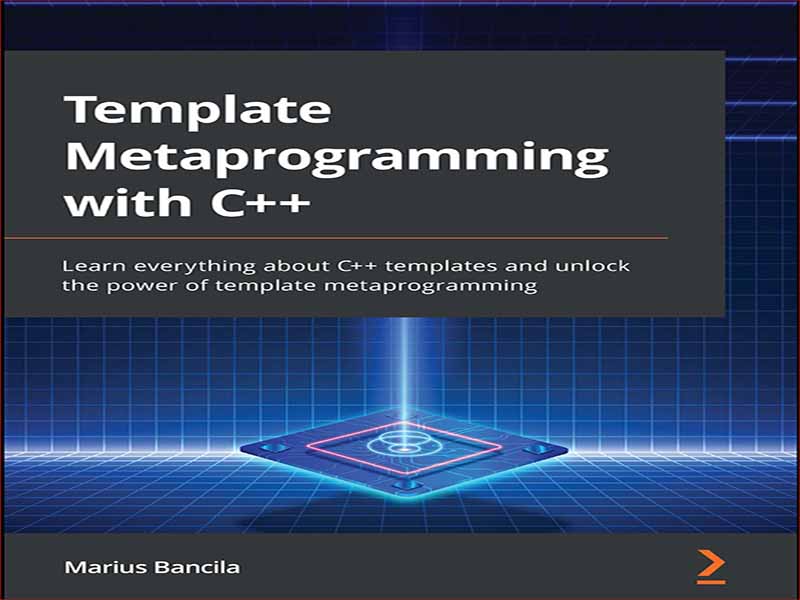- عنوان: Template Metaprogramming with Cpp
- نویسنده/انتشارات: Marius Bancila
- حوزه: برنامه نویسی ++C
- سال انتشار: 2022
- تعداد صفحه: 480
- زبان اصلی: انگلیسی
- نوع فایل: pdf
- حجم فایل: 6.05 مگابایت
زبان برنامه نویسی C++ یکی از پرکاربردترین زبان های دنیاست و چندین دهه است که همینطور بوده است. موفقیت آن فقط به دلیل عملکردی که ارائه می دهد یا شاید به راحتی استفاده از آن نیست، که بسیاری مخالف آن استدلال می کنند، بلکه احتمالاً به دلیل تطبیق پذیری آن است. C++ یک زبان برنامه نویسی همه منظوره و چند پارادایم است که برنامه نویسی رویه ای، عملکردی و عمومی را با هم ترکیب می کند.
برنامه نویسی عمومی یک پارادایم از نوشتن کد است، مانند اینکه موجودیت هایی مانند توابع و کلاس ها بر اساس انواعی که بعداً مشخص می شوند نوشته می شوند. این موجودیتهای عمومی تنها زمانی که برای انواع خاصی که بهعنوان آرگومان مشخص شدهاند مورد نیاز است، نمونهسازی میشوند. این موجودیت های عمومی به عنوان الگو در C++ شناخته می شوند.
فرابرنامهنویسی تکنیک برنامهنویسی استفاده از الگوها (و توابع constexpr در C++) برای تولید کد در زمان کامپایل است که سپس با بقیه کد منبع برای کامپایل یک برنامه نهایی ادغام میشود. فرابرنامه نویسی به این معناست که حداقل یک ورودی یا یک خروجی یک نوع است.
همانطور که در C++ Core Guideless (سند بایدها و نبایدها که توسط Bjarne Stroustrup و Herb Sutter نگهداری می شود) الگوهای C++ شهرت بسیار وحشتناکی دارند. با این حال، آنها کتابخانه های عمومی مانند کتابخانه استاندارد C++ را که توسعه دهندگان C++ همیشه از آن استفاده می کنند، ممکن می سازند. چه خودتان الگوها را بنویسید یا فقط از الگوهایی استفاده کنید که توسط دیگران نوشته شده اند (مانند ظروف استاندارد یا الگوریتم ها)، قالب ها به احتمال زیاد بخشی از کد روزانه شما هستند.
این کتاب در نظر گرفته شده است تا درک خوبی از تمام طیف قالب های موجود در C++ (از نحو اولیه آنها تا مفاهیم در C++20) ارائه دهد. این موضوع محور دو بخش اول کتاب خواهد بود. بخش سوم و آخر به شما کمک می کند تا دانش تازه به دست آمده را برای انجام فرابرنامه نویسی با قالب ها عملی کنید.
The C++ programming language is one of the most widely used in the world and it has been so for decades. Its success isn’t due just to the performance it provides or maybe to its ease of use, which many would argue against, but probably to its versatility. C++ is a general-purpose, multi-paradigm programming language that blends together procedural, functional, and generic programming.
Generic programming is a paradigm of writing code such as that entities such as functions and classes are written in terms of types that are specified later. These generic entities are instantiated only when needed for specific types that are specified as arguments. These generic entities are known as templates in C++.
Metaprogramming is the programming technique of using templates (and constexpr functions in C++) to generate code at compile-time that is then merged with the rest of the source code for compiling a final program. Metaprogramming implies that at least an input or an output is a type.
Templates in C++ have a reputation of being pretty horrendous, as described in the C++ Core Guideless (a document of dos and don’ts maintained by Bjarne Stroustrup and Herb Sutter). However, they make generic libraries possible such as the C++ Standard Library that C++ developers use all the time. Whether you’re writing templates yourself or just using templates written by others (such as standard containers or algorithms), templates are most likely part of your daily code.
This book is intended to provide a good understanding of all the spectrum of templates available in C++ (from their basic syntax to concepts in C++20). This will be the focus of the first two parts of the book. The third and final part will help you put the newly acquired knowledge into practice to perform metaprogramming with templates.
این کتاب را میتوانید بصورت رایگان از لینک زیر دانلود نمایید.
Download: Template Metaprogramming with C++



































نظرات کاربران